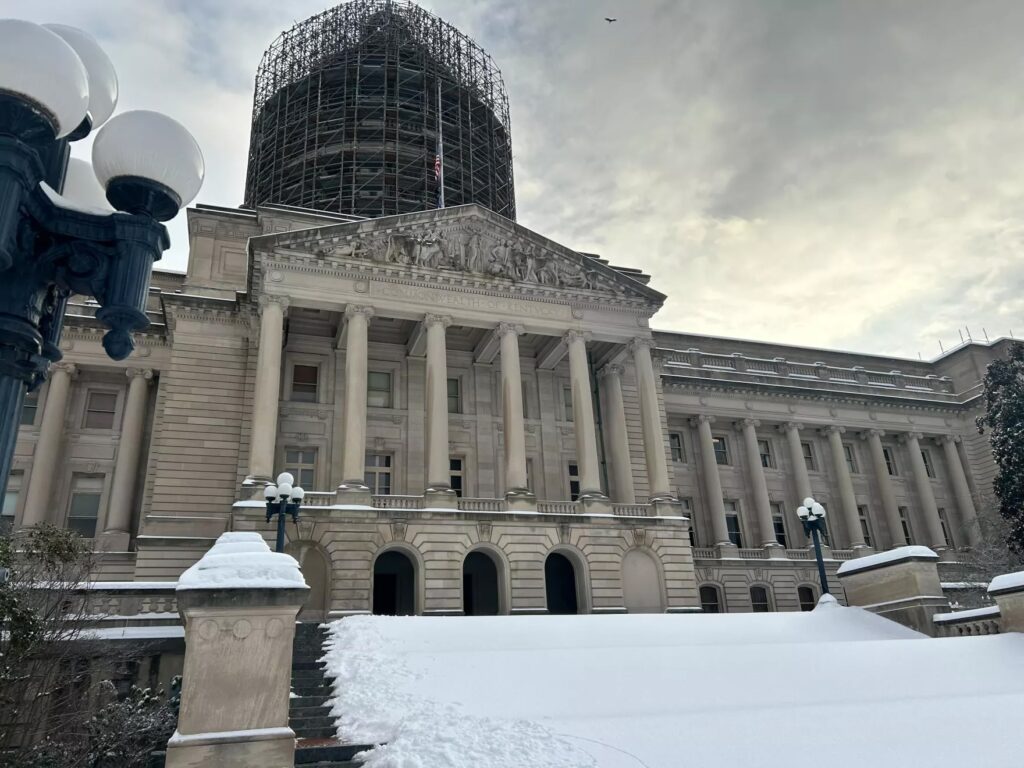A bill to lower Kentucky’s individual income tax rate by half a percentage point next year is the first legislation to begin moving in the new 2025 session of the General Assembly. It passed through the House budget committee Wednesday.

House Bill 1 would lower the income tax rate from 4% to 3.5% percent beginning in the 2026 calendar year. It cleared the committee by a 17-0 vote, with all Republicans voting yes and three Democrats passing on the vote.
The potential tax cut is made possible by the state hitting specific budget triggers last summer. A landmark bill passed in 2022 by the GOP supermajority creates a system to incrementally cut the rate by half a percentage point each year until it is eliminated, so long as the state’s revenue, spending and budget reserve trust fund reach certain levels.
Under this mechanism, the tax rate is lowered so long as the state budget reserve trust fund is at least 10% of General Fund revenue at the end of a fiscal year, and such revenue would have exceeded General Fund spending even if the tax rate had been one percentage point lower.
Rep. Jason Petrie, the GOP chairman of the budget committee from Elkton, said the objective of the tax cut mechanism is to increase the population of Kentucky. Advocates like Petrie say a lower tax rate would cause more people and employers to locate and remain there. Republicans often cite neighboring Tennessee as their model, which has no individual income tax and whose population has increased substantially compared to Kentucky.
Jason Bailey, the executive director of left-leaning think tank Kentucky Center for Economic Policy, testified to the committee that the tax cut was the wrong move. He noted it creates a permanent tax cut, despite the fact that revenue is already projected to decline in the short term after years of temporary surplus created by large federal stimulus and pandemic-spurred global inflation.
“I urge you to approach a permanent decision like this with some caution and with a full picture of the fiscal risk to your constituents and your community,” Bailey said.
The fiscal note attached to House Bill 1 projects the tax cut would decrease state revenue by $359 million in the first half of 2026, and then $718 million annually going forward. General Fund revenue was north of $15 billion in the last fiscal year.
According to the state’s most recent economic forecast, Kentucky’s revenue is projected to be $213 million less than last year and it will face a revenue shortfall of nearly the same amount at the end of the current fiscal year on June 30.
Bailey and some Democrats have warned that cutting taxes at the onset of projected decreases in revenue could jeopardize the state’s ability to provide needed services, such as public education and Medicaid coverage. They often point to the example of Kansas from a decade ago, which enacted large tax cuts, but then had to reverse them because the decline in tax revenue was much larger than expected.
Despite sharing some of those concerns, Democratic Gov. Andy Beshear already signaled last month that he would sign a bill to cut the tax rate should the legislature pass it and send it to his desk.
“One concern that I have — while I’m glad there are guardrails — the train only moves one direction,” Beshear said. “We will hit a point where we can’t provide the services people expect from government if we lose too much revenue. But I believe with our booming economy, this next income tax cut is something we can do and still provide the services that are out there.”
The tax cut bill is expected to clear the full House chamber Thursday afternoon, where Republicans hold a dominant 80-20 supermajority. The Senate is expected to pass the bill into law in February, once the legislature returns from a three-week break.
This story is republished with permission from WKMS. Read the original.
Joe Sonka is Kentucky Public Radio’s first enterprise statehouse reporter. He joined the team in October 2023.
Joe has covered Kentucky government and politics for nearly two decades. He grew up in Lexington and moved to Louisville in 2011, covering city and state government at LEO Weekly and then Insider Louisville. He became state government reporter for the Courier Journal in 2019 and was a lead reporter for the newspaper's 2020 Pulitzer Prize-winning series on former Gov. Matt Bevin's controversial pardons just before leaving office.
You can email Joe at jsonka@lpm.org and find him at non-Twitter apps such as Threads (@joesonkaky) and BlueSky (@joesonka.bsky.social).






